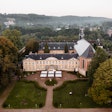
Scott Givens is the founder and C.E.O. of FiveCurrents, an international creative production firm that specializes in corporate and stadium spectacles. He’s behind such huge-scale productions as the London 2012 Olympic Games and the Clinton Global Initiative. Givens also leads the evaluation committee for the International Olympic Committee in determining which countries are best fit to host future ceremonies, and he had a hand in organizing the bid behind Rio 2016. He’s always on the road, using two passports at all times—one while traveling abroad, while the other is sent away to attain his next visa requirements—and has long-term working visas in nearly a dozen countries.
We are storytellers, and whether the gathering is a plenary session for a local corporation or an Olympic opening ceremony with a TV audience of more than four billion viewers, our goal is the same: to capture the power of human emotion to create deep and lasting impressions.
If we are working on behalf of a brand, we want to engage the participants like never before in that company’s story. If we are engaged to create the image of a nation, we know that emotional connections are the key to memories of a lifetime. If we are trying to impact a local community, storytelling and being authentic to that place resonate.
Our events take place around the world, and we’ve had the opportunity to work closely with local governments to determine their goals and help sculpt a creative execution that moves the perception of that region forward. Although we work all over the world, our workforce is always predominantly local, and part of what makes our work so interesting is our collaboration with local vendors and personnel. These partners teach us the unique aspects of local cultures. I’ve learned to be less American and to take a more worldly perspective, particularly in initial meetings abroad.
When the city of Guadalajara, Mexico, was awarded the 16th Pan American Games, they saw an opportunity to show the world that they are a modern, future-facing city rooted in colorful Mexican culture. We worked with the organizing committee to deliver opening and closing ceremonies that were authentically Mexican yet distinctively modern, showcasing Guadalajara as a city proud of its heritage but with a distinct vision for the future.
The biggest challenge we faced on this production was Hurricane Jova, which hit Guadalajara the day after dress rehearsal for the opening ceremony and brought heavy winds and torrential downpours onto our exposed stadium. The final days of a production were tightly scheduled, and we had to juggle the needs for headline talent rehearsals, V.I.P. and protocol walk-throughs, and final preparations with Mother Nature. By problem-solving along the way, our production had enough management capacity to focus on Hurricane Jova and its ramifications, and we were able to deliver successful ceremonies that created positive momentum for the games and created a moment of national pride for the country.
[PULLQUOTE]
The Cinco de Mayo 150th anniversary celebration [in Puebla, Mexico] is another example of a global broadcast where we were tapped to rebrand a region and increase tourism. We worked with the governor and local government to create a live TV special celebrating the Mexican victory at the Battle of Puebla and highlighting Puebla as a cultural destination.
The governor was really committed to the production and wanted to connect the celebration of Cinco de Mayo to his state and principal city, where the Battle of Puebla took place 150 years ago. He participated in the creative development and weekly task force meeting to discuss issues from security to public relations and anything that could affect the event. The broadcast special was aired in 21 countries to more than 300 million people. Since our work in 2012, Puebla has been listed as a top tourism destination in many travel publications.
Each of these projects helped to improve the local economy and created jobs and a knowledge base to empower these cities to go after bigger projects and events. Large events have a dual impact—not only do they bring increased tourism and consumer spending to local businesses, but they also result in improvement to local infrastructure and city services.
The beauty of our business model is that we are not just about Olympic-size projects. Much of our work comes in the form of corporate and N.G.O. events like annual meetings and sales conferences, or even the Clinton Global Initiative, where we hire locally and use local volunteers, allowing them a chance to better their community and gain valuable experience working in a brand-new arena.
These events help infuse much-needed capital into smaller municipalities, and events such as Clinton Global Initiative America and Clinton Global Initiative International focus on large-scale initiatives specific to their regions.
For example, we just produced the Clinton Global Initiative university student gathering at Washington University in St. Louis, which brought thousands of visitors into the city, resulting in an influx of consumers converging on and revitalizing local neighborhoods. The students also participated in a day of service to give back to the local community.



















!['The Cathedral of St. John the Divine [in New York] is such a striking hidden gem and one of my favorite event venues in the city,' says Tinsel Experiential Design's Erica Taylor Haskins.](https://img.bizbash.com/files/base/bizbash/bzb/image/2024/09/_M627287_pano.66db3413ac491.png?auto=format%2Ccompress&fit=crop&h=112&q=70&w=112)